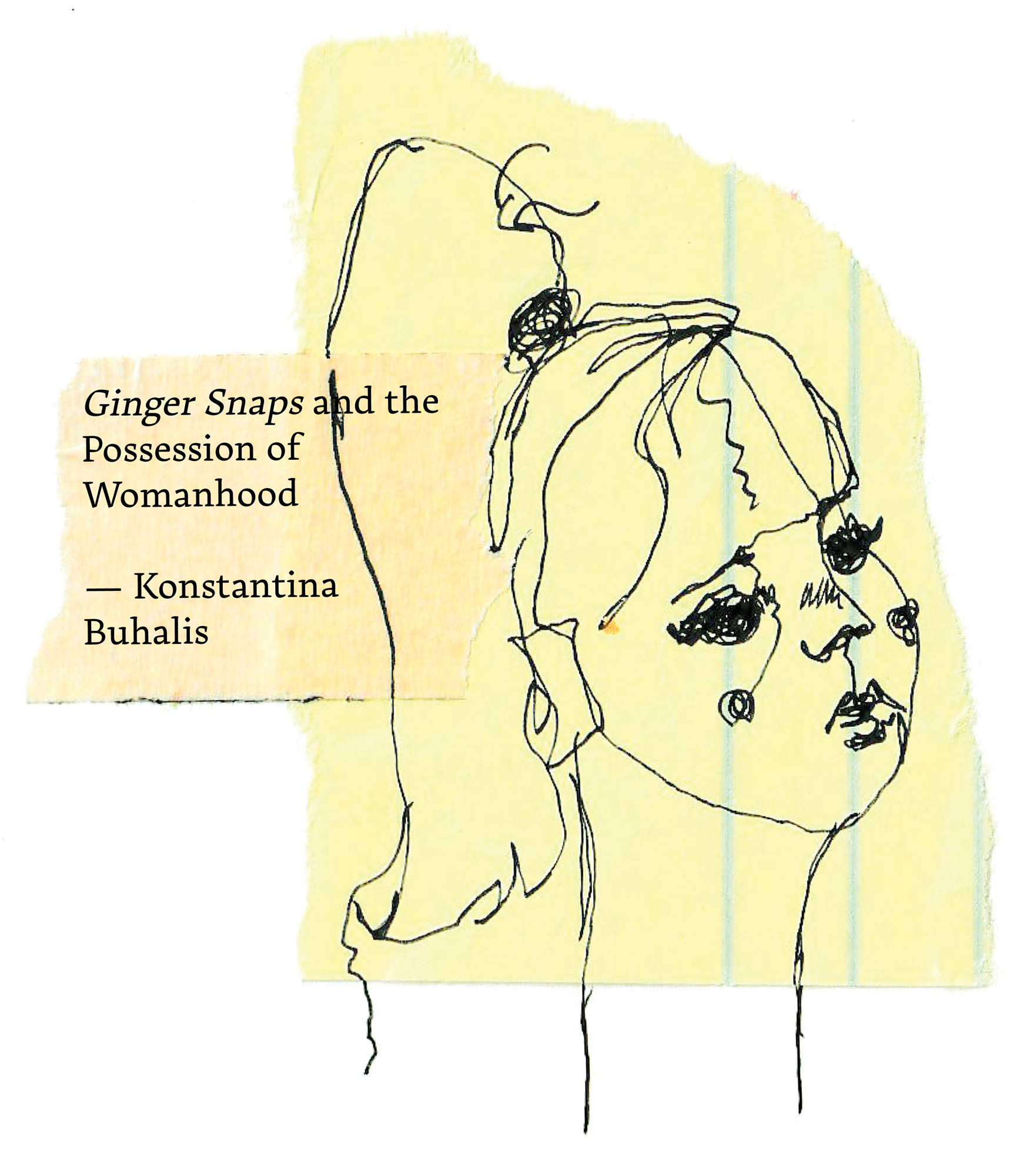Ginger Snaps and the Possession of Womanhood

To be a woman is to share your body. Womanhood is the tightrope walk of autonomy and subordination through coercion and self-preservation. The transition from girlhood to womanhood is bloody, painful, unexpected, and extraordinarily isolating. The 2000 Canadian horror film Ginger Snaps explains the gruesome shift into the horrors of femininity. Possession of womanhood and the culture surrounding the transformative nature of puberty in Ginger Snaps is shown through violence and female rage.
Ginger Snaps, directed by John Fawcett and written by Karen Walton, tells the story of two sisters, Bridgette and Ginger Fitzgerald, who are fascinated by carnage and death. They make a pact to move out of the suburbs or die at age sixteen. During a stretch of malicious dog killings around their neighborhood, the pair kidnaps the local mean girl’s dog. Amid the abduction, Ginger starts her first period. A creature attacks her, resulting in her transmutation. The attack changes Ginger, possessing her and altering her worldview. She engages in sexual behavior, struts the halls of her highschool with newfound confidence, and alienates her younger sister.
Ginger begins to take on the behavior of a werewolf. The wolf is often seen as a solitary creature, but is in fact a social animal. Ginger’s maturation reflects the social patterns of wolves, who move on from their birth pack to form a pack of their own. As young women grow, they build new social groups, separating from the originary relationships of their early childhood. Ginger destroys her once unshakeable bond with Bridgette, expanding her social circle and forming romantic entanglements. Ginger Snaps exhibits the finite loyalty that exists between young women and the rapidity with which it can be disrupted. When the order of the pack has been altered, this causes unrest, leading to isolation and eventually death. When Ginger becomes a wolf, it causes the literal death of her relationship with her sister. A beast takes over Ginger’s body, alters her DNA, and creates an insatiable, hormonally charged creature that stalks the shadows, waiting for a victim. As with menstruation, the biological change can’t be helped and is the signifier of time moving forward, the body and mind transforming into something new, naturally leaving a trail of destruction in its path.
Ginger Snaps brings the audience on the terrifying journey of menstruation and uncontrollable change. For young girls, the narrative of a period is one of shame. Throughout culture and religion, monthly bleeding is often used as social and emotional ammunition, reminding a woman that her worth is always tied to her body. Following this, the theme of the period in Ginger Snaps is a death sentence, with girlhood becoming a distant memory left to rot in the graveyard of time.
Ginger’s body is no longer just a physical shell the soul inhabits; now, it is a weapon, a walking temptation that must be hidden. But she refuses to hide, imbued by the violence and power of the wolf. With newfound agency and sexual liberation, Ginger asserts her freedom, becoming the aggressor in her first sexual encounter. Ginger’s fascination with violence is the mechanism of release, righteous blood sacrifices that maintain her sanity in an environment actively working to keep her submissive and fearful of her body. Ginger’s aggression gives her the upper hand, behaving as a man would, affording her protection, and giving her the social capital she needs to move freely. Ginger’s attitude forces others to act accordingly, not through a demand for respect but through fear. There is no difference when you’re a teenage girl; if boys fear you, they won’t catcall you, and if girls fear you, you can exist beyond their cliques. While Ginger sometimes protects her baby sister as an extension of herself, Ginger’s behavior is centered on her own well-being. She exerts ownership over Bridgette, controlling their lives and the narrative surrounding them. Ginger strives to maintain her life and her sister’s, eventually trying to “seduce” her into sexual agency and a future where they can co-exist.
Throughout the film, the point of womanhood isn’t celebrated. It becomes a burden, the cross to bear, another responsibility to manage. The biological signifier of womanhood isn’t a celebrated event. Suddenly, life changes, and the body you have autonomous control over warps itself into something unfamiliar and alien. Sexuality is thrust upon young girls without remorse. Mothers tell their daughters it’s their responsibility to stay out of trouble because now the consequences have doubled.
“I get this ache… And I, I thought it was for sex, but it’s to tear everything to fucking pieces.”
Ginger compares murder to masturbation, the desire for flesh manifesting in multiple orgasmic ways. Murder is more acceptable than a girl who owns her sexuality and desires pleasure. Ownership of the body becomes a desperate plea for independence in a world that denies women the opportunity to be in their power. Ginger’s authority over her body, especially in interactions with boys and men, exhibits confidence and recklessness with no fear of consequence or anxiety about her future. Ginger kills a male guidance counselor like a rabid animal. Through violence and rage, no man can act as her oppressor.
Ginger Snaps offers alternate views of changing womanhood through the characters of Pamela Fitzgerald, Ginger and Bridgette’s mother, as well as through Bridgette herself. Due to her age, Pamela is no longer seen as inherently sexual but simply a mother and wife, with her individuality replaced by social signifiers. Pamela is free. She can fully possess her body because she is simply invisible. Because she is no longer seen as a sexual object, Pamela is free. Meanwhile, Bridgette refuses to give in to the pressures of growing up and fights back against the oppressive nature of teendom. She strives to create a life that she can be comfortable in, even if that means breaking away from the parasitic relationship with her sister, becoming an independent person, and making the conscious choice to live on her own terms. Unfortunately, Ginger never sees a life beyond her lycanthropic transformation, but she does become a symbol of growth and autonomy despite her suffering.
Ginger Snaps has thrilled audiences and has been the subject of feminist study for years. Ginger Snaps offers an unflinching look at the female experience of the transition from childhood to adulthood as the monstrous event it often is, but also approaches the subject with humor and charm. Ginger Snaps helped define a genre of horror that utilizes the metaphor of the monster to explore what it means to be a woman.
Entertainment writer. Horror lover. Aging goth. Detroit.
Instagram: @michigoth
Patreon: tinatlking
